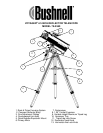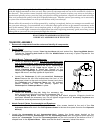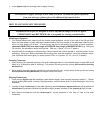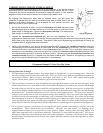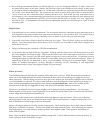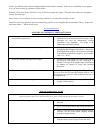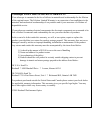
4. Insert Eyepiece (8) into focusing tube to begin viewing.
Your Bushnell Voyager Telescope is now ready to be used. To obtain the fullest enjoyment
from your telescope, please refer to the additional information below.
HOW TO USE YOUR NEW TELESCOPE
Astronomical telescopes are designed in such a way that the image you will see appear
UPSIDE DOWN and REVERSED, this is acceptable for viewing celestial bodies.
Selecting an Eyepiece:
1. You should always start viewing with the lowest power eyepiece, which in this case is the 20 mm lens.
Note: the base power of each eyepiece is determined by the focal length of the telescope objective lens,
which for this model is 540 mm. A formula can be used to determine the power of each eyepiece:
telescope OBJECTIVE lens focal length EYEPIECE focal length = MAGNIFICATION (e.g. Using the
20 mm lens, the calculation would look like this: 540 mm ÷ 20mm = 27x or 27 power.)
2. Included with this telescope is a Barlow lens. Barlow lenses are used to double or triple the power of your
telescope. Place your Barlow between the focusing tube and the eyepiece. Using the example above,
your 3x Barlow lens would give you a total power of 81x or 81 power. (27 x 3 = 81x or 81 power)
Focusing Telescope:
1. After selecting the desired eyepiece, aim main telescope tube at a land-based target at least 200 yards
away (e.g. A telephone pole or building). Fully extend focusing tube by turning Rack and Pinion Focusing
Mechanism (1).
2. While looking through selected eyepiece (in this case the 20 mm), slowly retract focusing tube by turning
Rack and Pinion Focusing Mechanism until object comes into focus.
Aligning Finderscope:
1. Look through Eyepiece (8) and establish a well-defined target. (see focusing telescope section) Tighten
all lock knobs (Declination, Latitude, Right Ascension, and Horizontal Axis) so that telescope’s aim is not
disturbed.
2. Looking through Finderscope (7), alternate tightening each Finderscope Adjustment Screw until crosshairs of
Finderscope are precisely centered on the same object already centered in the Eyepiece (8) field of view.
3. Now, objects located first with the Finderscope (7) will be centered in the field of view of the main
telescope.



